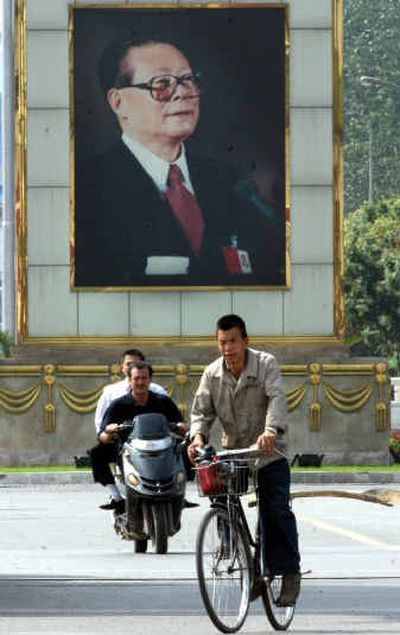Calm power transfer is a first for China

BEIJING — More than a year after becoming China’s president, Hu Jintao was handed the full reins of power Sunday when his predecessor, Jiang Zemin, gave up the nation’s most powerful military post.
The move ends an awkward power-sharing arrangement that has seen two rival camps maneuvering for position as China faces a number of major foreign- and domestic-policy challenges, such as relations with Taiwan, North Korea’s nuclear program, government corruption and rapid economic growth.
The nation learned of the change in a somber newscast Sunday evening at the conclusion of a four-day, closed-door meeting of the Communist Party’s central committee. The announcement suggested that the move was Jiang’s idea, even though the 78-year-old former president had been under growing pressure to step aside in favor of Hu, 61.
Jiang’s resignation clears the way for the next generation to put its full stamp on affairs of state, but analysts said they did not expect any immediate shift in China’s foreign or domestic policies as Hu and Premier Wen Jiabao continue moving incrementally.
Still, many observers said the transition shows that China’s governing machinery is gradually modernizing, making decisions more on the basis of consensus and enhancing political control over the military.
After the disorderly transition between Mao Zedong and Deng Xiaoping, and another between Deng and Jiang, Jiang’s departure completes China’s first orderly leadership handover since the Communists took over in 1949.
“This is great for China and great for Jiang himself,” said Wang Yukai, professor at the National School of Administration in Beijing. “Jiang has successfully filled his historic task, and other leaders will now have much more freedom. This is the real start of the Hu era.”
In assuming Jiang’s position as chairman of the powerful Central Military Commission, Hu now holds the nation’s three top posts — president, military head and Communist Party chief. While Jiang retains a second military title in the government until March, analysts said it is largely ceremonial.
In the 18 months since becoming president, Hu has cultivated a more down-to-earth image than Jiang, who was seen as a somewhat-stuffy champion of the privileged. With populist touches and sympathetic gestures toward farmers and migrant workers, Hu and Wen have won support among average Chinese.
“There’s a move to be the party of the common man rather than the party of elites,” said Stephen Green, head of the Asia program at Chatham House, an independent institute based in London. “I think they’ll continue in that direction.”
Symbolism and good public relations aside, however, Hu and Wen’s vision for China has been relatively hard to glean. Although Hu said last week that following the West’s political model would be a “dead end” for China, many observers hope he is more reform-minded than Jiang.
“We’ll have to see in the next few months whether there’s been a real consolidation or if they’re just rearranging the deck chairs,” Green added.
Despite Jiang’s departure, analysts said they expect Hu to continue moving cautiously in the coming months, reflecting both his personal style and the need to consolidate his position.
Hu, as military chairman, also must tread carefully in handling relations with China’s 2.5 million person People’s Liberation Army. He has no military background — although Jiang did not either — and must finesse the PLA’s push for bigger budgets and its inclination to want to use force to guarantee the eventual reunification of Taiwan with the mainland.
“Taiwan is a big problem, including how to satisfy the PLA,” said Wang Changjiang, professor with the Central Party School in Beijing. “Still I don’t see Hu or Wen taking any big steps for a while.”